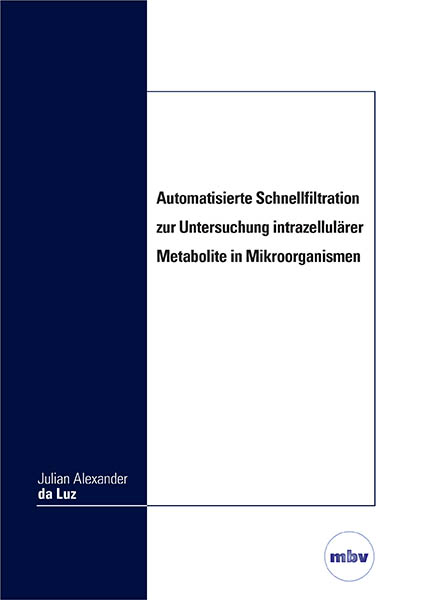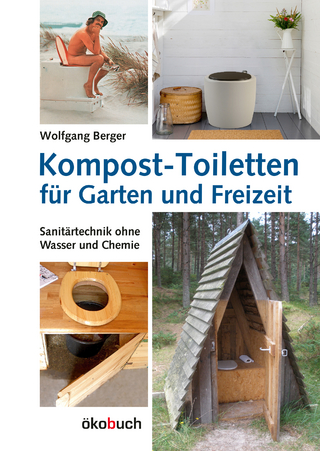
Automatisierte Schnellfiltration zur Untersuchung intrazellulärer Metabolite in Mikroorganismen
Seiten
2017
|
1. Aufl.
Mensch & Buch (Verlag)
978-3-86387-796-5 (ISBN)
Mensch & Buch (Verlag)
978-3-86387-796-5 (ISBN)
- Keine Verlagsinformationen verfügbar
- Artikel merken
The analysis of intracellular metabolites in microorganisms requires fast and precise sampling and an effective quenching of the cells metabolism. To avoid leakage of intracellular metabolites during sampling while keeping the sampling time as short as possible, a method for automated fast filtration was developed in this work. With this leakage-free sampling method it was possible to reduce the time for sampling, filtration, washing of the filter cake and on-filter quenching of the cells with liquid nitrogen down to 6 seconds. This substantial reduction of sampling time was mainly due to the integration of the fast filtration system into an automated fast sampling system and thus an automation of the whole sampling procedure for fast filtration. The influence of cell density and the different growth phases during batch cultivation on the automated fast filtration were investigated. The comparison of automated fast filtration and sampling with cold methanol quenching led to 75 % higher intracellular amino acid concentrations in Escherichia coli with the automated fast filtration method. The application of the newly developed method for the investigation of the L-Lysine producion by Corynebacterium glutamicum clearly showed the influences of the genetic modifications in the producing strain on intracellular metabolite levels. It was shown, that the intracellular concentrations of all amino acids of the aspartate- and lysine- metabolism were increased in the production strain, while all other determined amino acids decreased. Furthermore it was shown, that the allosteric inhibition of the aspartate-kinase by lysine and threonine was reduced, but due to the elevated intracellular concentrations of the inhibitors it was still inhibiting the enzyme activity significantly, which shows the importance of further deregulation of the inhibition of this enzyme. The method for intracellular metabolite sampling developed in this work allows the detailed analysis of microbial metabolism and thus enables the targeted application of systems biology methods for strain and process development. In particular, the design of regulatory proteins and the dynamic regulation of metabolic pathways require precise information about intracellular metabolite concentrations in microorganisms. Die Analyse intrazellulärer Metabolite in Mikroorganismen erfordert eine schnelle und fehlerfreie Probenahme und ein effektives Quenchen des Zellmetabolismus. Um einen Verlust von intrazellulären Metaboliten bei der Probenahme zu verhindern und gleichzeitig eine möglichst kurze Probenahmezeit zu erreichen, wurde in dieser Arbeit eine Methode zur automatisierten Schnellfiltration entwickelt. Mit dieser verlustfreien Methode wurde die gesamte Probenahmezeit für Filtration, Filterkuchenwaschung und Quenchen der Zellen auf dem Filter mit flüssigem Stickstoff auf bis zu 6 Sekunden reduziert. Die deutliche Verringerung der Probenahmezeit konnte vor allem durch die Integration der Schnellfiltration in ein automatisiertes Probenahmesystem und die damit verbundene Automatisierung der Arbeitsschritte erreicht werden. Es wurde der Einfluss der Zelldichte, sowie der verschiedenen Phasen von Batch Kulturen auf die Schnellfiltration untersucht. Ein Vergleich der automatisierten Schnellfiltration mit einer Probenahme mit Quenchen durch kalte Methanollösung zeigte um 75 % erhöhte intrazelluläre Aminosäurekonzentrationen in Escherichia coli mit der automatisierten Schnellfiltration. Die Anwendung der entwickelten Methode zur Untersuchung der L-Lysin Produktion mit Corynebacterium glutamicum zeigte deutliche Einflüsse von genetischen Modifikationen auf die intrazellulären Metabolite des Produktionsstammes. So zeigte sich, dass die intrazellulären Konzentrationen aller Aminosäuren des Aspartat- und Lysinstoffwechsels beim Produktionsstamm erhöht waren, während alle anderen untersuchten Aminosäuren abnahmen. Weiterhin konnte gezeigt werden, dass die durch genetische Modifikationen verringerte Endproduktinhibierung der Aspartat-Kinase durch Lysin und Threonin aufgrund erhöhter Inhibitorkonzentrationen weiterhin zu einer deutlichen Verringerung der Enzymaktivität führte, was die weitere Deregulierung der Inhibierung dieses Enzyms erforderlich macht. Die in dieser Arbeit entwickelte Methode zur Probenahme von intrazellulären Metaboliten ermöglicht eine detaillierte Analyse des mikrobiellen Stoffwechsels und erlaubt somit den zielgerichteten Einsatz systembiologischer Methoden für die Stamm- und Bioprozessentwicklung. Insbesondere für die Entwicklung regulatorischer Proteine und die dynamische Regulation von Stoffwechselwegen sind genaue Informationen über die Konzentrationen intrazellulärer Metabolite notwendig.
| Erscheinungsdatum | 09.11.2017 |
|---|---|
| Verlagsort | Berlin |
| Sprache | deutsch |
| Maße | 1480 x 2100 mm |
| Gewicht | 300 g |
| Themenwelt | Technik ► Umwelttechnik / Biotechnologie |
| Schlagworte | Extraktion • intrazelluläre Metabolite • Metabolom • Mikroorganismen • Probenahme • Quenchen • Schnellfiltration |
| ISBN-10 | 3-86387-796-9 / 3863877969 |
| ISBN-13 | 978-3-86387-796-5 / 9783863877965 |
| Zustand | Neuware |
| Haben Sie eine Frage zum Produkt? |
Mehr entdecken
aus dem Bereich
aus dem Bereich
Kommentar der DIN 15905-5, LärmVibrationsArbSchV und …
Buch | Softcover (2023)
DIN Media (Verlag)
58,00 €
Sanitärtechnik ohne Wasser und Chemie
Buch | Hardcover (2023)
Ökobuch Verlag
17,95 €
Buch | Softcover (2023)
DIN Media (Verlag)
75,40 €


